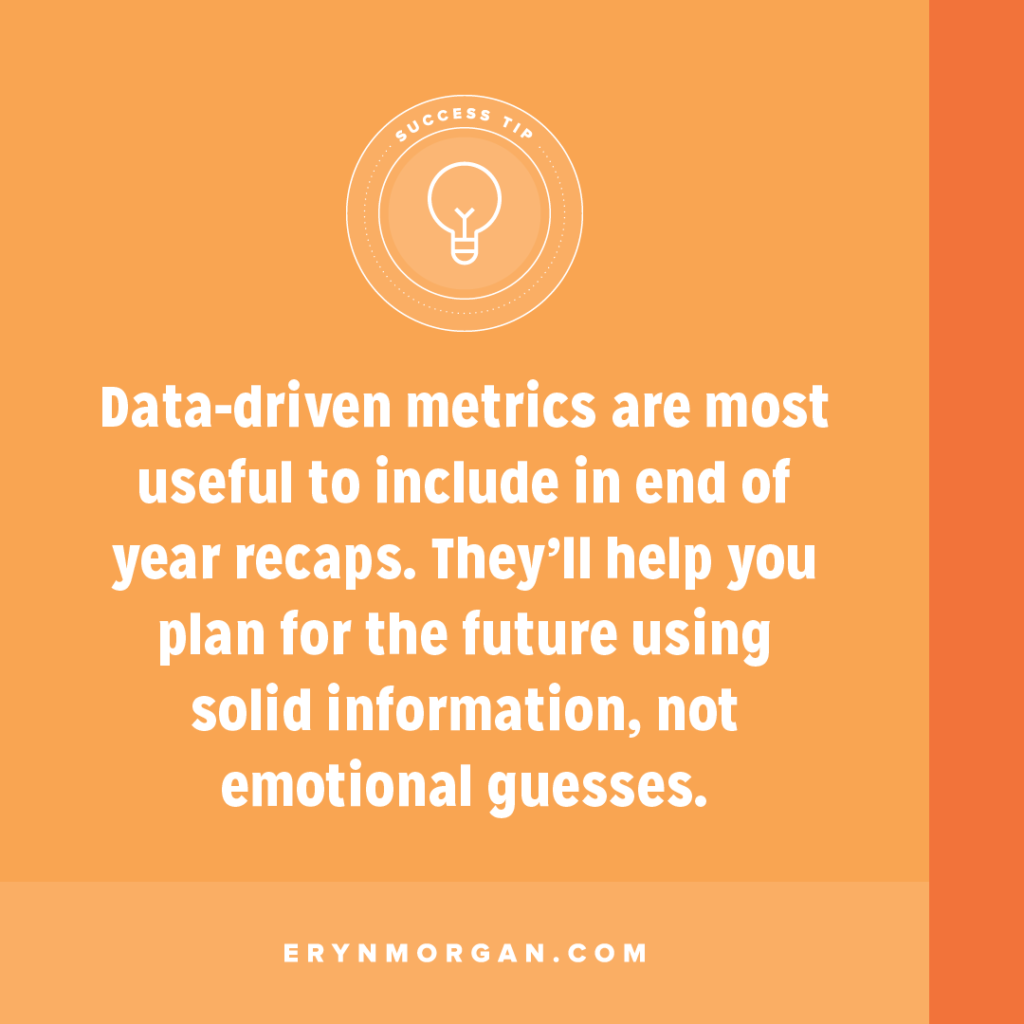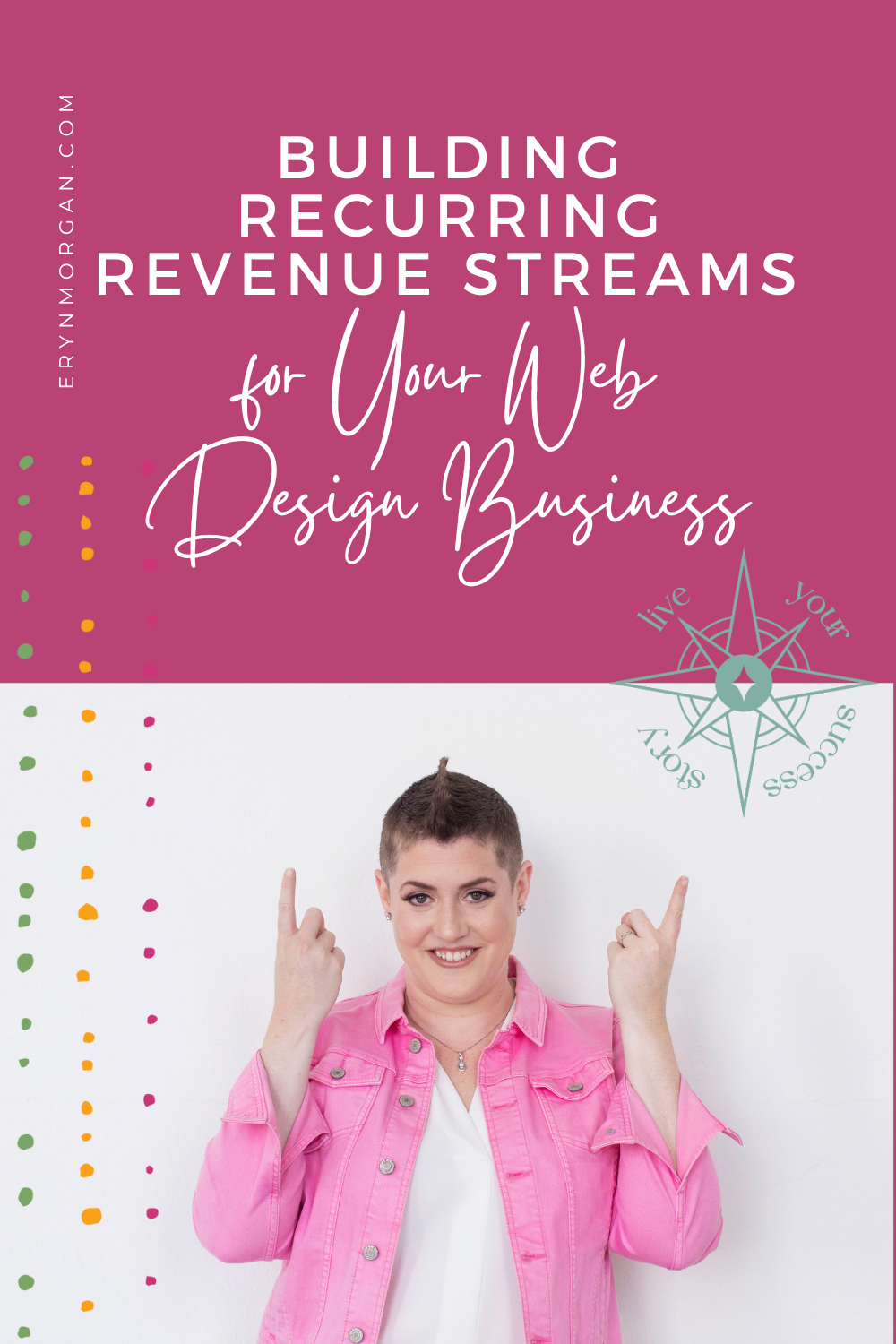
Learning from your mistakes and looking back so you can make effective plans is great advice. But here’s the thing… I hate traditional “end-of-year” reflections.
See, I forget what I do in a year. I don’t know what I did last week. Part of that is a gift because I don’t actually remember if something wasn’t quite right. I can hit the highlights, but I don’t get bogged down in things.
Further, I prefer to stay present from week to week in my business instead of waiting a whole year, or even a quarter, to note what needs to pivot.
So, when I see end-of-year reflections, I get a little nervous. And it seems like a lot of people use those reflections on the past to beat up on themselves, which doesn’t feel right to me.
On the other hand … Because the year (and the decade!) is coming to a close, I’m thinking about looking back ever so slightly. I know, I can be a walking contradiction—but hear me out on this one.
When done in a certain way, looking back can be an incredible tool to set yourself up for success in the future.
When you recap the past business year with results-driven data, you can look forward and set goals with intention.This is how I’d encourage you to do your end-of-year reflections.
Look at the Top-Line Numbers
Money was my Achilles’ heel this year. Learning how to manage cashflow was the most challenging thing I did all year. And I’ll be brutally honest—I didn’t always get it right. I stumbled a few (… or more) times when I didn’t pre-plan and think proactively about the money moving through my business.
I knew I had to master it in order to teach it to my clients, so I had to look at top-line data and remove emotion. After all, my mistakes are in the past and can’t be changed. But they can provide learning opportunities.
Often, people look at these lessons with a sense of regret. They see the things they didn’t do or that didn’t work. They use the past to beat themselves up.
Then, when they start to look forward, they bring that sadness, regret, and negative energy into their new plans instead of clearing it and starting fresh.
The point of me realizing I had struggled with cashflow wasn’t so I could get down on myself. It was so I could recognize it was a problem and do something about it.
Instead of seeing what you didn’t do or what didn’t work (AKA: where you “failed”), take a survey of your business and write down some data points—without emotion.
To get the ball rolling, ask yourself:
- What marketing was successful and hit my conversion goals?
- What marketing fell short of my goals?
- What were my offerings this year?
- How many clients did I serve?
- How many projects did I complete?
- What top-line revenue did I bring in?
- What did I pay myself and/or bring home at the end of the day?
Success Tip: Don’t use your past to beat up on your future.
Maybe you’ll note that you introduced three new offerings and they all never got off the ground. That’ll be a clue not to rely on those next year because your audience didn’t respond to it. See, nothing to get upset about; you’re simply collecting information to guide your future plans.
Find Historical Markers
Part of looking at top-line data includes noting historical markers. These data-driven items are useful to know because they’ll help you create a solid future plan.
A few years ago, one of my clients didn’t take into account how many snow days and delays her kids had. It totally threw off her plans and she missed her revenue goal that quarter because she had to miss out on work.
When she started keeping track of that, she knew to add extra time in her schedule during the snowy months to give herself breathing room in case something came up. Not every winter is the same, but she had an approximate metric that helped her prepare.

Success Tip: Data-driven metrics are most useful to include in end of year recaps. They’ll help you plan for the future using solid information, not emotional guesses.
Reflect on Your Life Areas
Life areas is another great place from which to draw data and this exercise refocuses us to live holistic lives. I like using life areas in my vision boards to draw in what I want my entire reality to hold, not just my business. (It’s how I called in brand new diamond earrings. True story!)
If you’re mapping out your vision board, you’ll most likely be able to list a ton of things in the “livelihood and lifestyle” category if you’re like most business owners. I know from experience that the other vision board categories may be a little sparse. Don’t judge yourself or get upset. You’re simply noticing your progress in each life area.
After you’ve reviewed your top-line data points, jot down some reflections about these areas of your life:
- Creativity / Learning
- Relationships / Society
- Body / Wellness
- Essence / Spirituality
- Livelihood / Lifestyle
Ask yourself, “In this area, how did I do this month/quarter/year?”
For example: you may say that you took a fun online challenge that helped you create more time in your day. Or you completed a course that taught you about legally protecting your business (which isn’t as fun, but essential to be a responsible business owner).
Maybe, aspirationally, you thought you would go to yoga every week, but in reality, you went three times. Knowing that will help you set goals that are more attainable and bring attention to all areas of your life. Things will feel more in balance so you can create your future yearly goals in alignment with it.
Set Your Future Vision
Instead of beating yourself up, all of this work that you did to recap your year was in service of asking, “How can we make it better?” By looking at facts and data, what was successful, and where you can tweak things going forward, you have a clear idea of the holistic health of your business.
Now that you have that information to help guide your plan, you can set a future vision that’s really strong and create a future-focused, action-driven plan for your business.
I’m curious: what data points do you include in your yearly recaps? Share with us in the comments below!


